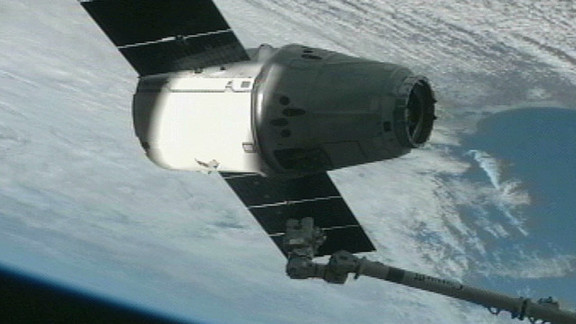On Sunday, after the failure of three of its four thrusters, SpaceX's Dragon capsule successfully docked with the International Space Station. The Dragon is a cargo capsule that delivered 1,200 pounds of supplies for use on the ISS. The technical difficulty that resulted in the loss of power from three of the Dragon's thruster pods was said to be a problem with the propellant valve. However, this problem was corrected with plenty of time to easily reach the ISS.
This successful mission is a step forward for the privatization of spaceflight. Elon Musk, CEO of SpaceX, hopes to make a big impact on the future of space technology with his new company. SpaceX has a contract with NASA, and will execute ten more missions on their behalf. SpaceX, along with Virgin Galactic, is a new generation of private space businesses that will make a tremendous impact on the future of spaceflight.
As most know, NASA retired its orbiter (space shuttle) fleet last year and hopes to enlist the help of private companies like SpaceX in Earth orbit missions. NASA has begun work on new rocket technologies that could reach the Moon by 2020. Although private companies like SpaceX and Virgin Galactic may have an impact on suborbital flight, NASA plans to keep its control of deep space exploration. The ISS, with its experimentation aging, will be decommissioned in the near future. The focus is moving away from Earth and to a possible Mars settlement. The influence of private companies like SpaceX on the future of space exploration could range from negligible to significant.
http://www.cnn.com/2013/03/03/us/spacex-launch/index.html?hpt=us_bn1
This successful mission is a step forward for the privatization of spaceflight. Elon Musk, CEO of SpaceX, hopes to make a big impact on the future of space technology with his new company. SpaceX has a contract with NASA, and will execute ten more missions on their behalf. SpaceX, along with Virgin Galactic, is a new generation of private space businesses that will make a tremendous impact on the future of spaceflight.
As most know, NASA retired its orbiter (space shuttle) fleet last year and hopes to enlist the help of private companies like SpaceX in Earth orbit missions. NASA has begun work on new rocket technologies that could reach the Moon by 2020. Although private companies like SpaceX and Virgin Galactic may have an impact on suborbital flight, NASA plans to keep its control of deep space exploration. The ISS, with its experimentation aging, will be decommissioned in the near future. The focus is moving away from Earth and to a possible Mars settlement. The influence of private companies like SpaceX on the future of space exploration could range from negligible to significant.
http://www.cnn.com/2013/03/03/us/spacex-launch/index.html?hpt=us_bn1

 RSS Feed
RSS Feed